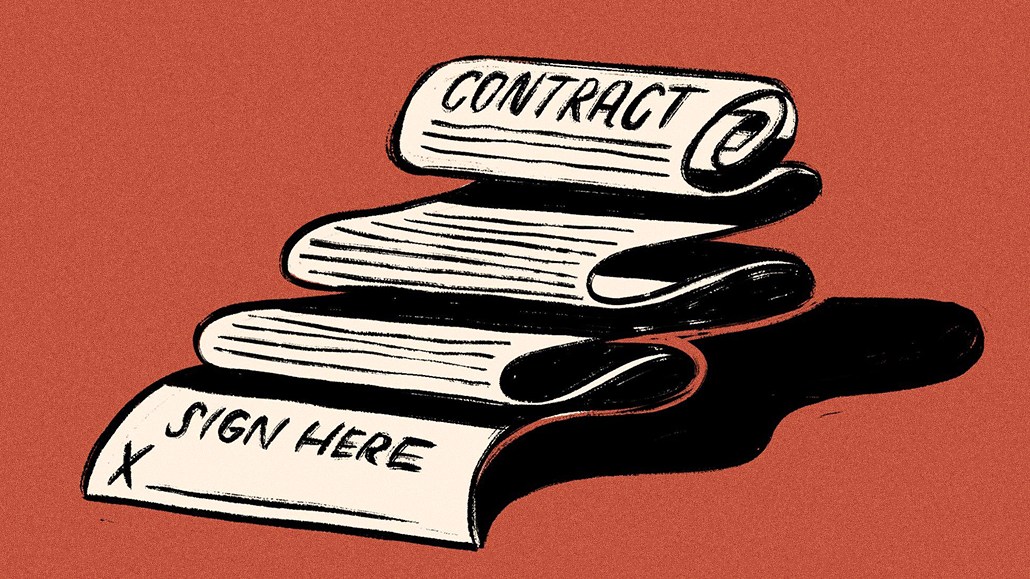Insights from CTV leaders at Dentsu, Horizon Media and more
Why gaming and esports talent management is still growing up in 2024

As a Digiday+ member, you were able to access this article early through the Digiday+ Story Preview email. See other exclusives or manage your account.This article was provided as an exclusive preview for Digiday+ members, who were able to access it early. Check out the other features included with Digiday+ to help you stay ahead
Talent management in gaming and esports has become a big business, yet it remains a veritable Wild West, with bad actors and conflicts of interest galore. Veterans of the space believe it still has a long way to go if it wants to become truly equitable for all involved.
Like many businesses in the space, gaming and esports talent managers flourished following the COVID-19-sparked boom in gaming activity in 2021 and 2022. This year, however, some brands’ gaming budgets have returned to pre-COVID levels, forcing talent managers to pivot to keep up, whether by helping their creators build independent businesses or by focusing on more lucrative individual deals with non-endemic brands.
To better understand how talent management in gaming and esports is shaping up in 2024, Digiday spoke to eight talent managers representing a range of companies across the industry. Here are some of the challenges they are facing — and how they hope to overcome them.
Potential rivals
In recent years, talent managers in gaming and esports have increasingly found themselves in contention with esports organizations as the orgs take on more of a role in the professional lives of their players. In spite of this potential encroachment, however, dedicated gaming and esports talent managers do not view esports orgs as true rivals. Managers who spoke to Digiday said that they believe their business model is inherently friendlier to creators than that of esports orgs, which are incentivized to prioritize org-wide deals over individual sponsorships.
“Look at many esports teams in the space right now; they’re still wearing the jerseys and promoting an overall brand,” said Brandon Freytag, co-founder and chief of creator monetization of the talent management firm Loaded. “We’re not doing either — no one’s repping a Loaded jersey or pushing Loaded as a brand. So I think there is always going to be that difference.”
The last few years have also seen an influx of larger talent agencies into gaming and esports, such as United Talent Agency, which has significantly grown its gaming and esports practice since acquiring endemic agencies Press X and Everyday Influencers in 2018.
The involvement of larger talent agencies in the space is a mixed bag for endemic management firms. It reflects an uptick in brands’ interest in gaming and esports, which is good for everyone. On the other hand, managers of smaller influencers fear that UTA’s presence could risk vacuuming up brand deals that may previously have gone to less-established creators.
“There’s a lot of really great independent managers out there that are doing double duty in terms of how they think about their business. But if you think about the biggest clients to scale, the clients that have really fundamentally grown the business, there’s always a team,” said UTA head of gaming and esports (and Press X and Everyday Influencers co-founder) Damon Lau. “And I think the agents, at the end of the day, provide an opportunity for clients to be able to scale their business.”
Friends and family
For better or worse, management by a friend or family member is a time-honored tradition in gaming and esports, and this has not changed in 2024. In the past, this strategy has proven successful for some gaming influencers such as Tyler “Ninja” Blevins, whose wife Jessica Blevins managed him until stepping down in late 2022. After all, there can be benefits to working with someone who knew you before you were famous.
“People are managed by their partners, their boyfriends, girlfriends, friends, et cetera,” said David Wales, co-founder of the talent management firm Nani Talent. “And none of that is problematic, so long as those people are professional in the way they go about things.”
But there are also inherent risks that come with blurring the lines between friendship and management. At the very least, working with a friend-manager can result in an influencer losing out on money due to inexperienced negotiation; at worst, it can allow for predatory management practices, with trusted managers taking an unduly large chunk of their clients’ sponsorship revenue.
“I think there’s a handful of folks that do a really good job, but it’s still a very nascent space, and a lot of the success that we all have had over the past five or six years has now changed dramatically,” said Justin Miclat, CEO of the management company The Kinetic Group. “And so we’re seeing this new cycle of representatives come in and out.”
Consolidation coming
Challenges notwithstanding, the past six months have not all been a story of doom and gloom for the gaming and esports talent managers that can successfully navigate the space. Both Nani Talent and The Kinetic Group have staffed up in 2024, with the latter specifically hiring a new salesperson to support its roster of 15 clients.
“Gaming very much is at the top of the list of priorities for UTA in general,” Lau said. “In the time that I’ve been here, not only have we significantly grown the business, the department, and the clients, but in general, there’s also been a cultural change of how entertainment views gaming.”
Still, many magers believe there will be fewer management firms operating in the gaming space by this point next year. After a year of M&A for esports organizations in 2023, changes are on the horizon for the talent management side of the industry in 2024.
“I anticipate a consolidation of talent management companies this year and next,” Miclat said, “somewhat similar to the dissolution and consolidation of orgs.”
More in Marketing

Creator marketing has the reach — CMOs want the rigor
The creator economy got big enough to be taken seriously.

Pitch deck: Why Google believes its latest AI Max product is a game changer for search campaigns
AI Max, which launched May and rolls out this summer, aims to provide advertisers with a “one-click feature suite” for search campaigns.

Retail media’s mid-2025 reality: Why advertisers are going all in on full-funnel
Retail media’s meteoric rise may finally be leveling off — and that’s forcing advertisers to take a harder look at what they’re getting for their money.








